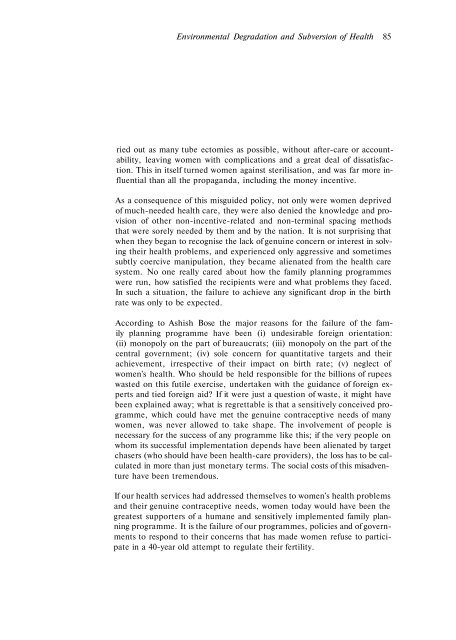Environmental Degradation and Subversion of Health - Dag ...
Environmental Degradation and Subversion of Health - Dag ...
Environmental Degradation and Subversion of Health - Dag ...
You also want an ePaper? Increase the reach of your titles
YUMPU automatically turns print PDFs into web optimized ePapers that Google loves.
<strong>Environmental</strong> <strong>Degradation</strong> <strong>and</strong> <strong>Subversion</strong> <strong>of</strong> <strong>Health</strong> 85<br />
ried out as many tube ectomies as possible, without after-care or accountability,<br />
leaving women with complications <strong>and</strong> a great deal <strong>of</strong> dissatisfaction.<br />
This in itself turned women against sterilisation, <strong>and</strong> was far more influential<br />
than all the propag<strong>and</strong>a, including the money incentive.<br />
As a consequence <strong>of</strong> this misguided policy, not only were women deprived<br />
<strong>of</strong> much-needed health care, they were also denied the knowledge <strong>and</strong> provision<br />
<strong>of</strong> other non-incentive-related <strong>and</strong> non-terminal spacing methods<br />
that were sorely needed by them <strong>and</strong> by the nation. It is not surprising that<br />
when they began to recognise the lack <strong>of</strong> genuine concern or interest in solving<br />
their health problems, <strong>and</strong> experienced only aggressive <strong>and</strong> sometimes<br />
subtly coercive manipulation, they became alienated from the health care<br />
system. No one really cared about how the family planning programmes<br />
were run, how satisfied the recipients were <strong>and</strong> what problems they faced.<br />
In such a situation, the failure to achieve any significant drop in the birth<br />
rate was only to be expected.<br />
According to Ashish Bose the major reasons for the failure <strong>of</strong> the family<br />
planning programme have been (i) undesirable foreign orientation:<br />
(ii) monopoly on the part <strong>of</strong> bureaucrats; (iii) monopoly on the part <strong>of</strong> the<br />
central government; (iv) sole concern for quantitative targets <strong>and</strong> their<br />
achievement, irrespective <strong>of</strong> their impact on birth rate; (v) neglect <strong>of</strong><br />
women's health. Who should be held responsible for the billions <strong>of</strong> rupees<br />
wasted on this futile exercise, undertaken with the guidance <strong>of</strong> foreign experts<br />
<strong>and</strong> tied foreign aid? If it were just a question <strong>of</strong> waste, it might have<br />
been explained away; what is regrettable is that a sensitively conceived programme,<br />
which could have met the genuine contraceptive needs <strong>of</strong> many<br />
women, was never allowed to take shape. The involvement <strong>of</strong> people is<br />
necessary for the success <strong>of</strong> any programme like this; if the very people on<br />
whom its successful implementation depends have been alienated by target<br />
chasers (who should have been health-care providers), the loss has to be calculated<br />
in more than just monetary terms. The social costs <strong>of</strong> this misadventure<br />
have been tremendous.<br />
If our health services had addressed themselves to women's health problems<br />
<strong>and</strong> their genuine contraceptive needs, women today would have been the<br />
greatest supporters <strong>of</strong> a humane <strong>and</strong> sensitively implemented family planning<br />
programme. It is the failure <strong>of</strong> our programmes, policies <strong>and</strong> <strong>of</strong> governments<br />
to respond to their concerns that has made women refuse to participate<br />
in a 40-year old attempt to regulate their fertility.
















